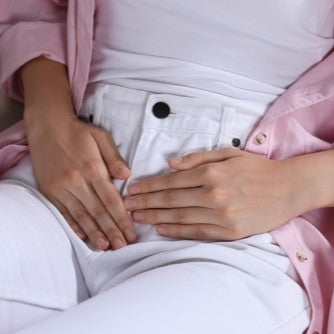If you've landed on this article, chances are you have some curiosity around the menopausal transition . Perhaps you've noticed irregular periods or maybe you're approaching your midlife years and are wondering when the change will happen for you. Whatever it may be, you've come to the right place to learn more. The menopausal transition isn't a mere fragment of time - rather, we regard it as an era of life. This is because there are three phases of menopause. The first phase is perimenopause, the mid phase is menopause and the last phase is postmenopause. The age you'll begin to feel the effects of perimenopause varies - keep reading to learn more.
What Age Will You Experience Perimenopause?
What age will I experience perimenopause? This is a common question that comes from folks who are curious when their menopausal journey will begin. According to the North American Menopause Society, the average age of perimenopausal onset is about 4 years before the final menstrual cycle. Most women tend to stop menstruating around 51 years of age, so that means many begin to experience perimenopause at age 47. However, some women see changes in their bodies even soon and can stop menstruating around age 45, meaning they enter the perimenopausal phase around age 41. Premature menopause is considered to be when a woman experiences her final menstrual period before age 40, thus entering perimenopause in her mid 30s. A gentle reminder: it is possible to get pregnant during perimenopause, so be sure to have a chat with your gynecologist about the best birth control options for you.
Everybody is different, so it can be difficult to pinpoint the expected age of perimenopause. However, the menopausal journey tends to remain somewhat the same amongst family members. Speaking to the women in your family can help provide clarity around when you can expect to begin your evolution. If you're starting to feel like you're entering the perimenopausal phase (read on to understand key symptoms), give your women's health expert a call. They can administer a blood test to measure your follicle-stimulating hormone levels also known as FSH. It is typically understood that when the follicle-stimulating hormone levels are measured at 30 mL or higher plus she hasn't had a menstrual period for 12 consecutive months, she has reached the menopause phase. Remember, the menopause phase is regarded as the 12 month period without a menstrual cycle. This means that once you haven't bled for 12 months, you have another 12-24 months (expert opinions vary on this length of time) before you can consider yourself in the postmenopausal phase.
If you've undergone a hysterectomy, meaning you've had your ovaries removed, you're likely to enter the menopausal era earlier. The same applies if you've received certain cancer treatments, including breast cancer treatment. If that is your case, make sure to chat with your healthcare expert for the most realistic menopausal timeline.
Symptoms of Perimenopause
As we dig into the symptoms of perimenopause, let's start with a quick science lesson around the cause of menopause. Menopause occurs when the body begins to experience changes in its sex hormones, specifically estrogen and progesterone. This is due to the ovaries producing less key hormones and ceasing to release eggs. This is a gradual process, thus explaining the necessity of three separate phases of menopause. These decreased estrogen levels during perimenopause will trigger hot flashes, vaginal dryness, mood changes or mood swings, and irregular periods. Fun stuff, huh? Luckily, there are solutions for each of these menopausal transition symptoms.
Our Core Dietary Supplement tackles the seven most common symptoms of menopause, including hot flashes, vaginal dryness, night sweats, disrupted sleep, mood swings, brain fog, and fatigue. If you find that vaginal dryness is particularly bothersome for you, we have a Daily Vaginal Lotion that immediately tackles discomfort. Folks report feeling relief after just two applications. Vaginal dryness is yet another side effect of those fluctuating estrogen levels. Our vaginal lotion is hormone-free and is filled with nourishing plant humectants and Vitamin E.
The Core Supplement
Shop Now
If you find that mood changes are beginning to significantly impact your life, consider reaching out to a mental health professional. Mindfulness, cognitive behavioral therapy, and antidepressants are all options on the table as effective treatment for overwhelming menopausal mood changes.
Your healthcare provider may bring up hormone therapy as an option for managing symptoms related to the menopausal transition. While hormone replacement therapy is an option for some, it isn't for everyone. It is linked to an increased risk of breast cancer, so we suggest trying out natural methods for relief first. A natural method that is often suggested is black cohosh. Black cohosh can have pretty uncomfortable side effects like stomach upset, cramping, headache, rash, vaginal bleeding, and weight gain - so some opt to avoid this supplement.
Navigating Hot Flashes
Ah, hot flashes. They get their own section. Hot flashes and night sweats are two common signals of the menopausal transition women experience that often get the worst rap. They're joked about in popular culture and can often feel like one of the more uncontrollable symptoms of menopause. Yet, they can be managed naturally.
First, let's understand the cause of hot flashes. When your estrogen levels lower in your body, your hypothalamus becomes more sensitive. The hypothalamus regulates your body's temperature, so when it becomes hypersensitive, it also becomes overactive. So if you experience body temperature fluctuations of just one or two degrees, your hypothalamus will go into overdrive in an attempt to regulate your body heat. This, in turn, triggers a hot flash. A night sweat is the same concept, but when you're sleeping. As you can imagine, our body's temperature varies quite a bit while we're sleeping, thanks to cozy blankets and chilly air conditioner units. Thus, a night sweat is a hot flash so strong it jolts you from your sleep.
We recommend tackling menopausal symptoms like hot flashes and night sweats both with lifestyle changes and natural supplements. Our Core Dietary Supplement minimizes the occurrence of hot flashes thanks to its key ingredient Pycnogenol, which promotes healthy blood circulation.
Light and breathable fabrics can help keep your body cool. Look for natural fibers like silk, cotton, and linen. The same goes for your face masks - after all, staying safe during the COVID-19 pandemic is key. Consider keeping a damp washcloth on your bedside to press on your forehead and neck during a night sweat. You can even drop a touch of eucalyptus essential oil for further cooling effects.
A Menopause-Friendly Lifestyle
As you look towards your midlife years, lifestyle matters. This isn't solely due to your menopausal transition, but certainly is partially because of it. As you evolve into your midlife years, many postmenopausal women report that osteoporosis, heart disease, high cholesterol, and weight gain can all become concerns. Decreased estrogen levels can lead to bone loss, which in turn can lead to osteoporosis. Calcium can help offset this natural bone less. As for heart disease, high cholesterol, and weight gain? Regular exercise and a healthy diet full of vegetables and lean meats can help keep these ailments at bay! Keep in mind that ovarian cancer is typically found in postmenopausal women, so be sure to keep up with your annual gynecologist visits.
Our Promise to You
Perimenopause, menopause, postmenopause and all the side effects in between can add some challenges to your midlife evolution. Social support is a great way to lift your spirits throughout menopause and beyond. We created a Facebook group for like-minded women to connect about life during the menopausal era. Join us!
Want more tailored education and recommendations specific to your own health journey? Take the Kindra hormone assessment to get the answers you deserve.
The Menopause Quiz
Continue the Conversation
Leave a Reply
Tags: About Menopause Anxious body Connection Dry Skin Fatigue Foggy & Unfocused Hair Loss Hot flashes Joint Pain Low Sex Drive Managing my Hormones menopause 101 Mental Well-Being Moody & Irritable Night Sweats Painful Sex perimenopause Physical Well-Being Sad Stressed Trouble Sleeping Vaginal Dryness Weight Gain
















Oh those hot flashes!! Love this article and Kindra products— such a big help! Thank you!
— Gwen T
This is soo interesting! Love it
— Tina